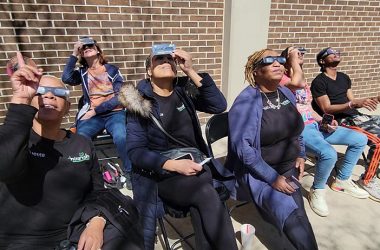
Despite slow progress, three local legislators say they see things happening on issues around community policing issues.

U.S. Rep. Robin Kelly, who represents Homewood and Flossmoor in Congress, Illinois Rep. Deborah Meyers-Martin, who represents sections of Homewood and Flossmoor in the Illinois House, and Cook County Commissioner Donna Miller, who represents Homewood on the county board, recently sat down for a discussion with the Homewood-Flossmoor Chronicle to offer updates on topics they discussed after George Floyd’s death in 2020.
The three agree that the outcry from the community pushed elected officials to take action.
Miller said she wants the public to know that “people are listening, people care, people wanted to do something. And they might not have seemed like they had their voices heard before, but now they do. And now that we can put some money towards, you know, making these programs work. Hopefully, we’ll see some changes come.”
Kelly had the Congressional Black Caucus in Chicago for a meeting with young people.
“They raised the issue of violence. They raised the issue of mental health that came up over and over. They talked about voting,” she said.
The three legislators raised concerns about the perceived threatening climate Black youth face when interacting with police. That hasn’t changed. They each know Black families are still having “the talk” with their children about how to react when stopped by police.
But Kelly, Meyers-Martin and Miller believe police, especially in the South Suburbs, are examining how they present themselves and the issues they deal with. They say they have been interacting with police and have gotten good responses to their proposals.
Miller pointed to the 10 Shared Principles adopted by police departments, including in Homewood and Flossmoor, where the principles were adopted in 2018.
Miller, who represents 30 different municipalities in the 6th District, said, “I went to every police department in the South Suburbs to ask them, have they instituted the 10 Shared Principles of Policing and that was a really good conversation to have,” Miller said, “because some were very familiar, some had and some were in the middle of doing that and that kind of was eye-opening to me.
“I think that’s a testament to the diversity of the communities that we live in and a testament to good policing that wants to do the right thing.”
After the Floyd tragedy, Meyers-Martin said Illinois’ elected officials worked on a number of pieces of legislation, including the Criminal Justice Reform Act. It set out that “police officers wear body cams by a certain year. It requires that there be decertification committees to make sure that bad policemen did not remain on the force or even have the ability to leave one force and go to another force when they have been found to to be in violation of the law.”
Meyers-Martin said: “We actually worked diligently with police chiefs to make sure that we were on point with some of the legislation that was being introduced.”
She also applauds efforts to help those with mental illness, noting: “We realize that mental health in many situations, is at the core of crime, at the core of disruption in communities” and police need training and support in dealing with the mentally ill that can happen now that Illinois established Community Emergency Services and Support Act.
On the federal level, emphasis has been on the George Floyd Justice in Policing Act. It passed in the House in 2021 but failed in the Senate. Kelly isn’t certain it will pass now because the Republicans, who didn’t vote for the bill then, are now the majority in the House. She said one sticking point to passage was language on police accountability.
“We haven’t forgotten about (the bill), especially as a member of the Congressional Black Caucus,” Kelly said.
Bipartisan passage of the 2022 Safer Communities Act put major changes in place on background checks, red flag laws and made funding available for mental health programs. It was a major achievement, Kelly said, adding, “We’re hoping that, if we could get to the root causes, you know, gun violence or violence in general, that that would also help in lessening these acts of young black men getting shot.”
While Kelly, Meyers-Martin and Miller each works at a different level of government, they say their work complements the efforts of the others and has put a spotlight on what efforts are needed in light of Floyd’s murder. What can’t be passed on a broad national level may be easier to pass on the state or county level.
Kelly, who has worked for local government, on the state level and now in Congress, said, “I feel like in the South Suburbs that they put one broad brush on us: who they think lives here, how smart we are, what we can afford.”
Despite best efforts, Kelly said, “sometimes that gets ingrained in people almost like internalized oppression for some people, but also it leads you to think: ‘Oh, they’re all like this,’ which is not true. We’re a very diverse area in the Southland.”
To stand up for oneself and the community is essential, Meyers-Martin stressed.
“Many residents don’t know that they have the power to be involved. They have the power to make a difference, but they have to be engaged, they have to,” she said. “They have to speak up, and they have to voice their concerns. And they have to be agreeable to working together with neighbors, working with law enforcement.”





